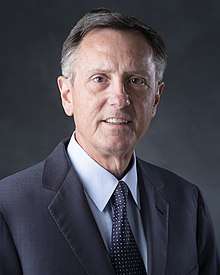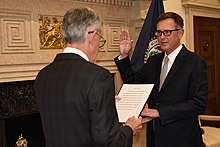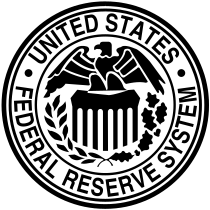Richard Clarida
Richard Harris Clarida (born May 18, 1957) is an American economist and Vice Chairman of the Federal Reserve. He is the C. Lowell Harriss Professor of Economics and International Affairs at Columbia University and, until September 2018, Global Strategic Advisor for PIMCO. He is notable for his contributions to dynamic stochastic general equilibrium theory and international monetary economics. He is a former Assistant Secretary of the Treasury for Economic Policy and is a recipient of the Treasury Medal.
Richard Clarida | |
|---|---|
 | |
| Vice Chairman of the Federal Reserve | |
| Assumed office September 17, 2018 | |
| President | Donald Trump |
| Preceded by | Stanley Fischer |
| Member of the Federal Reserve Board of Governors | |
| Assumed office September 17, 2018 | |
| President | Donald Trump |
| Preceded by | Daniel Tarullo |
| Assistant Secretary of the Treasury for Economic Policy | |
| In office February 7, 2002 – May 16, 2003 | |
| President | George W. Bush |
| Preceded by | David Wilcox |
| Succeeded by | Mark Warshawsky |
| Personal details | |
| Born | May 18, 1957 Herrin, Illinois, U.S. |
| Political party | Republican[1] |
| Education | University of Illinois at Urbana–Champaign (BS) Harvard University, (MA, PhD) |
Education
Clarida received his Bachelor of Science degree in Economics from the University of Illinois with Bronze Tablet honors, and his Master of Arts and Doctor of Philosophy degrees from Harvard University. In October 2018 he received the College of Liberal Arts and Sciences Alumni Achievement Award from the University of Illinois.
Academic career and research contributions
Since 1988, Clarida has taught in the economics and international affairs programs at Columbia University, where he is the C. Lowell Harriss Professor of Economics. From 1997 until 2001, Clarida served as chairman of the Department of Economics at Columbia University. Earlier in his career, he had been a member of the Cowles Foundation at Yale University.
Clarida's research centers on dynamic stochastic general equilibrium modeling, a branch of applied general equilibrium theory that is influential in contemporary macroeconomics optimal monetary policy, especially through the lens of time series analysis. His studies with Jordi Galí and Mark Gertler suggest that monetary policy in many countries today resembles a forward looking Taylor rule, whereas the policy makers of the 1970s failed to follow such a forward looking Taylor rule.[2]
Clarida has published numerous frequently cited articles in leading academic journals on monetary policy, exchange rates, interest rates, and international capital flows. He is frequently invited to present his research to the world's leading central banks, including the Federal Reserve, the ECB, the Bank of England, and the Bank of Japan. He has written on the monetary policy implications of the low-inflation period created by the 2008 financial crisis.[3] He also introduced in 2014 the concept of a “new neutral” for Fed monetary policy which predicted a substantial decline in r*, the interest rate consistent with full employment and stable inflation. Whereas before the crisis r* was thought to be above 4 percent, Clarida wrote in 2014 that r* was now closer to 2 percent than to 4 percent.
Other professional achievements
Clarida served as the Assistant Secretary of the United States Treasury for Economic Policy, a position that required confirmation by the United States Senate. In that position, he served as chief economic advisor to two Treasury Secretaries, Paul O'Neill and John W. Snow, advising them on economic policy issues, including the U.S. and global economic prospects, international capital flows, corporate governance, and the maturity structure of U.S. debt. In May 2003, Treasury Secretary John W. Snow awarded Clarida The Treasury Medal in recognition for his record of outstanding service to the Treasury Department.[4]
Clarida has served as a consultant to several prominent financial firms, including the Global Foreign Exchange Group at Credit Suisse First Boston and Grossman Asset Management. From 2006 to 2018, he was Global Strategic Advisor with PIMCO and in 2015 was named managing director with the firm. He is a member of the Council on Foreign Relations. Clarida was director of the NBER Project on and Editor of G7 Current Account Imbalances: Sustainability and Adjustment. From 2004 to 2018 he served as co-editor of the NBER International Macroeconomics Annual[5][6]

On April 24, 2018, Clarida was officially nominated by President Donald Trump to succeed Stanley Fischer as Vice Chairman of the Federal Reserve.[7] On August 28, 2018 the United States Senate voted to confirm Clarida by a margin of 69 - 26. He assumed office on September 17, 2018.[8]
Personal life
Clarida grew up in Herrin, Illinois.[9] In 1989 he married Polly Morgan Barry.[10]
In 2016 he released Time No Changes', a 13-track album.[11]
References
- Timiraos, Nick (April 16, 2018). "Trump to Nominate Richard Clarida, Michelle Bowman to Fed Board" – via www.wsj.com.
- Clarida, Richard; Gali, Jordi; et al. (1999). "The science of monetary policy: a New-Keynesian perspective" (PDF). Journal of Economic Literature. 37 (4): 1661–707. doi:10.1257/jel.37.4.1661.
- Clarida, Richard (October 2010). "What Has – and Has Not – Been Learned about Monetary Policy in a Low Inflation Environment? A Review of the 2000s" (PDF). Federal Reserve Bank of Boston.
- "PIMCO Bio". PIMCO. Archived from the original on March 20, 2012.
- "National Bureau of Economic Research Bio". NBER.
- "Bloomberg Bio". Bloomberg. Archived from the original on October 23, 2015.
- "Seven Nominations Sent to the Senate Today". The White House. April 24, 2018. Retrieved April 29, 2018.
- "Richard H. Clarida sworn in as Vice Chairman and member of the Board of Governors" (Press release). Federal Reserve System. September 17, 2018. Retrieved September 17, 2018.
- Peterson, Doug (October 8, 2018). "A new tune in economics". University of Illinois. Retrieved November 16, 2018.
- "Richard Clarida And Polly Barry Wed in Westport". June 18, 1989. Retrieved March 31, 2019.
- Timiraos, Nick (December 14, 2018). "Parsing the Lyrics at the Fed". WSJ. Retrieved March 31, 2019.
External links
| Political offices | ||
|---|---|---|
| Preceded by David Wilcox |
Assistant Secretary of the Treasury for Economic Policy 2002–2003 |
Succeeded by Mark Warshawsky |
| Government offices | ||
| Preceded by Daniel Tarullo |
Member of the Federal Reserve Board of Governors 2018–present |
Incumbent |
| Preceded by Stanley Fischer |
Vice Chair of the Federal Reserve 2018–present | |
